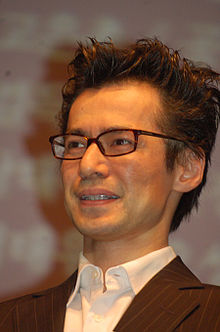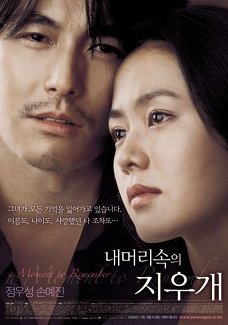
A Moment to Remember is a 2004 South Korean romantic drama film based on the 2001 Japanese television drama Pure Soul. It stars Jung Woo-sung and Son Ye-jin and follows the theme of discovery in a relationship and the burdens of loss caused by Alzheimer's disease.

Shin Ha-kyun is a South Korean actor. He is known for his roles in television series Brain (2011), Soul Mechanic (2020), Beyond Evil (2021), and films Joint Security Area (2000), Sympathy for Mr. Vengeance (2002), Save the Green Planet! (2003), Welcome to Dongmakgol (2005), Extreme Job (2019), and Inseparable Bros (2019).

Jung Woo-sung is a South Korean actor and the first Korean UNHCR Goodwill Ambassador. Jung started his career as a fashion model, rising to stardom and teenage cult status with the gangster film Beat (1997), for which he won Best New Actor at the 17th Korean Association of Film Critics Awards.

Jeong Jae-yeong is a South Korean actor. He is known for starring in the films Guns & Talks (2001), Silmido (2003), Someone Special (2004), Welcome to Dongmakgol (2005), Public Enemy Returns (2008), Castaway on the Moon (2009), Moss (2010), Confession of Murder (2012), Noryang: Deadly Sea (2023), as well as the television series Partners for Justice (2018–19).

Choi Dong-hoon is a South Korean film director and screenwriter. He ranks as one of the most consistently successful directors working in contemporary Korean cinema, with all first five of his films becoming commercial hits -- The Big Swindle attracted 2.12 million viewers, Tazza: The High Rollers at 6.84 million, Jeon Woo-chi: The Taoist Wizard at 6.13 million, The Thieves at 12.9 million, and Assassination at 12.7 million.
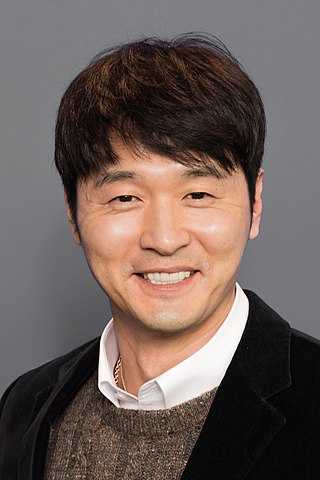
Lee Sung-jae is a South Korean actor. Among his notable works include the films Art Museum by the Zoo (1998), Attack the Gas Station (1999), Kick the Moon (2001), and Public Enemy (2002), as well as the television series Gu Family Book (2013).

Lee Jung-jae is a South Korean actor. Considered one of South Korea's most successful actors, he has received numerous accolades, including a Primetime Emmy Award, a Screen Actors Guild Award, a Critics' Choice Television Award, six Baeksang Arts Awards, in addition to nominations for a Golden Globe Award and a Gotham Award. Aside from his acting career, Lee is also a businessman, having launched a chain of restaurants in Seoul, as well as founding several businesses including the development company Seorim C&D. He owns several of his businesses with fellow actor and close friend Jung Woo-sung.

Many films, books, and other media have depicted the 1950—53 Korean War. The TV series M*A*S*H is one well known example. The 1959 novel The Manchurian Candidate has twice been made into films. The 1982 film Inchon about the historic battle that occurred there in September 1950 was a financial and critical failure. By 2000 Hollywood alone had produced 91 feature films on the Korean War. Many films have also been produced in South Korea and other countries as well.

Five Senses of Eros is a 2009 South Korean omnibus film with five short films depicting love and desire, but in different styles and genres. The shorts are: His Concern, directed by Daniel H. Byun; I'm Right Here, directed by Hur Jin-ho; The 33rd Man, directed by Yoo Young-sik; In My End Is My Beginning, directed by Min Kyu-dong; and Believe in the Moment, directed by Oh Ki-hwan.

Architecture 101 is a 2012 South Korean romance film written and directed by Lee Yong-ju. The film tells the story of two students who meet in an introductory architecture class and fall in love. Fifteen years later, the girl tracks down her first love to seek his help in building her dream house.
Lee Han is a South Korean film director and screenwriter. He is best known for the coming-of-age film Punch, which became one of the biggest hits on the South Korean box office in 2011.

Twenty is a 2015 South Korean coming-of-age comedy-drama film starring Kim Woo-bin, Lee Jun-ho, and Kang Ha-neul. It was written and directed by Lee Byeong-heon, his second feature after the 2012 indie Cheer Up, Mr. Lee.
Kim Hyun-seok is a South Korean film director and screenwriter. Kim wrote and directed YMCA Baseball Team (2002), When Romance Meets Destiny (2005), Scout (2007), Cyrano Agency (2010), and C'est Si Bon (2015). He also directed 11 A.M. (2013), and wrote If the Sun Rises in the West (1998) and Joint Security Area (2000).
Hong Seok-jae is a South Korean film director and screenwriter. Hong wrote and directed his thriller feature debut Socialphobia (2015), which won the NETPAC Award and DGK Award for Best Director at the 19th Busan International Film Festival in 2014, and the Best New Director and Best New Actor at the 24th Buil Film Awards in 2015. His short film Keep Quiet (2011) won the Special Jury Prize and I love Shorts! Audience Award at the Mise-en-scène Short Film Festival in 2012.
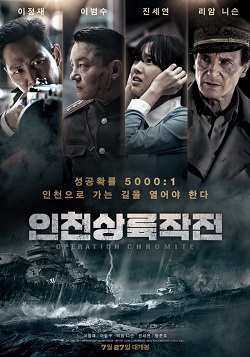
Operation Chromite or Battle for Incheon: Operation Chromite in US, is a 2016 South Korean spy war film co-written and directed by John H. Lee. It is a fiction based on a true story of Operation X-ray by ROK Navy Intelligence Unit and Operation Trudy Jackson by US Military Intelligence Unit, depicts espionages which took charge for preparatory stage of Operation Chromite in Korean War.

Lee Byeong-heon is a South Korean film director and screenwriter. He is best known for his 2015 film Twenty and 2019 film Extreme Job, the latter of which broke the record for the highest-grossing South Korean film.

The Last Princess is a 2016 South Korean period drama film directed by Hur Jin-ho with a screenplay by Hur Gin-ho, Choi Gun-ho, Lee Han-eol, and Seo Yoo-min, based on the best-selling novel by Kwon Bi-young. It stars Son Ye-jin as Princess Deokhye, the last princess of the Joseon Dynasty. The film depicts Princess Deokhye's life in Japan after she was forced to move there at age 13 by the Imperial Japanese government, and her attempts to return to Korea.
Lee Jung-gook is a South Korean film director and screenwriter. Lee's feature debut Song of Resurrection (1990) was banned as its plot deals with the 1980 Gwangju Uprising. He won critical acclaim for his second feature The Story of Two Women (1994) by winning numerous awards at the 32nd Grand Bell Awards, including Best Film, Best New Director and Best New Actress, and Best New Director at the 14th Korean Association of Film Critics Awards in 1994. A Thai version of The Letter was made in 2004, with the same title.
Jang Kun-jae is a South Korean film director, screenwriter and cinematographer. Jang debuted with Eighteen (2010) which won the grand prize win as part of the 2009 Vancouver International Film Festival's Dragons and Tigers Award. His second feature Sleepless Night (2013) picked up JJ-Star Award and JIFF Audience Award at the 2012 Jeonju International Film Festival. His third feature A Midsummer's Fantasia (2015) received several nominations, including Best Director and Best Screenplay at the 3rd Wildflower Film Awards.
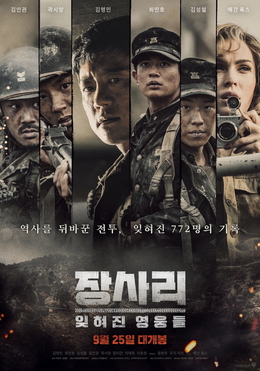
The Battle of Jangsari is a 2019 South Korean action-war film co-directed by Kwak Kyung-taek and Kim Tae-hoon, starring Kim Myung-min, Megan Fox, and Choi Min-ho in the lead roles.
